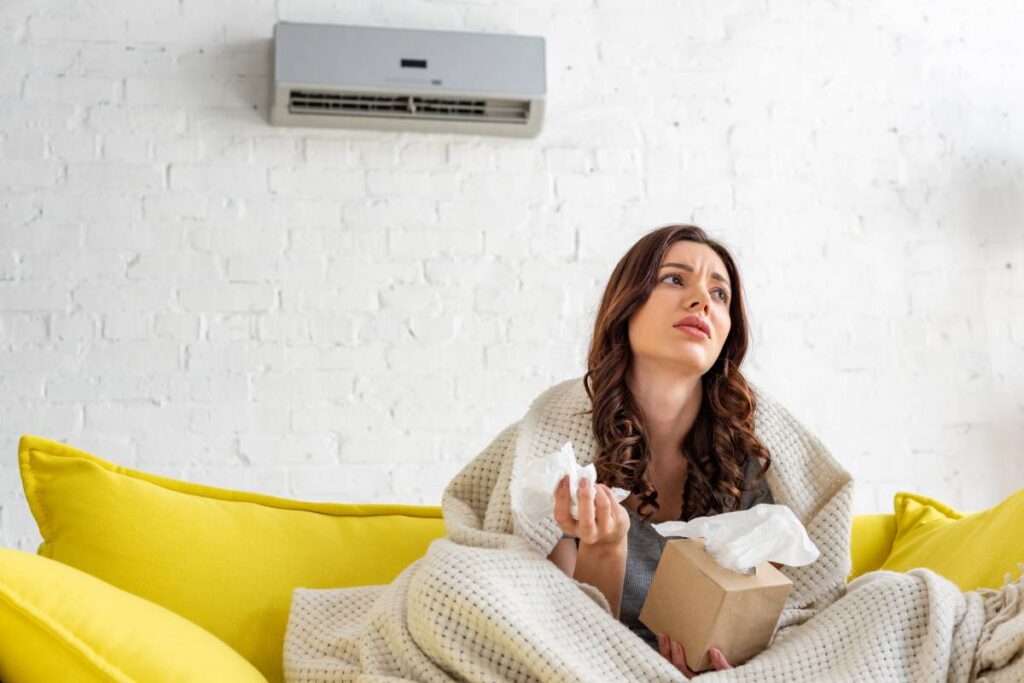
When the air conditioner is the cause of your sickness, you will usually feel better once you leave the AC room. The dryness and cold air can irritate your body in many ways.
For example, you may have difficulty breathing or notice your skin and eyes feel dry and uncomfortable. Sometimes you might get headaches or feel tired without an obvious reason. These symptoms often happen because of the effects of air conditioning, such as dry, cold air and sometimes dust or germs in the air.
How Do You Know If the Air Conditioner Is Making You Sick?

1. Breathing Problems
Dry air can cause your nose and throat to feel irritated and inflamed. This irritation makes it harder to breathe deeply and comfortably. If you already have asthma or allergies, these symptoms can get worse due to the effects of air conditioning.
2. Dry Skin and Eyes
The AC removes moisture from the air, which means your skin can become dry, flaky, or itchy. Your eyes may feel itchy, red, or burn like you have been staring at a screen for a long time. These effects of air conditioning can be uncomfortable and distracting during your day.
3. Headaches or Fatigue
When the air is too cold or stagnant, your body can get tired more quickly. You may notice headaches, dizziness, or a feeling of being weak. These symptoms are common effects of air conditioning because your body has to work harder to stay warm and breathe clean air.
4. Frequent Colds
If your AC is not cleaned regularly, it can spread bacteria, mold, or viruses in the air. This makes it easier for you to catch colds or respiratory infections more often. Frequent sickness is one of the worst effects of air conditioning and a warning sign to check your air conditioner.
5. Allergy-Like Symptoms
Some people get sneezing, runny noses, or itchy eyes in AC rooms. These symptoms can look like seasonal allergies but are often caused by dust or mold inside the AC unit. Cleaning the filters and ducts can reduce these effects of air conditioning.
Why Can’t I Breathe Properly in an AC Room?

Many people feel like they can’t breathe well in air-conditioned rooms. This happens mainly because the air from the AC is dry and doesn’t have enough fresh oxygen.
The dry air can irritate your nose and throat, making it hard to take deep, easy breaths. If the AC is dirty, it can blow dust and tiny particles that cause coughing or wheezing.
Cold air also makes your airways tighten a little, which can make breathing feel harder. Plus, when rooms are closed with poor air flow, the air can feel stuffy and uncomfortable to breathe. These are common problems caused by air conditioning.
1. Dry Air
AC units reduce humidity in the air, which dries out your mucous membranes. These membranes protect your respiratory system, so when they dry out, your breathing becomes uncomfortable. Dry air is a common effect of air conditioning and can also increase the risk of infections.
2. Poor Air Circulation
In some rooms, AC units recirculate the same air over and over without fresh airflow. This causes carbon dioxide to build up and lowers oxygen levels. The result is a heavy feeling in the chest and shortness of breath another effect of air conditioning that people often notice.
3. Dirty AC Unit
Dust, mold spores, and bacteria can accumulate in air filters and ducts. When the AC is running, it spreads these irritants into the air you breathe. This can cause coughing, asthma attacks, or other lung problems. This is one of the most serious effects of air conditioning if maintenance is ignored.
4. Too Cold
Air that is too cold can cause your chest muscles to tighten reflexively. This muscle tightening can make it harder to take a deep breath. Some people are more sensitive to cold air and feel breathing difficulties faster, a direct effect of air conditioning.
How to Fix Air Conditioner Sickness

You don’t need to give up your air conditioner to avoid feeling sick. Instead, you can take steps to improve the air quality and comfort of your room. Small changes can reduce dryness, irritation, and the spread of germs all common effects of air conditioning.
1. Clean Your AC Regularly
Make sure to clean or replace filters every 1 to 3 months. Wipe down vents and clean ducts once or twice a year. This removes dust, mold, and bacteria, improving the air quality and reducing the negative effects of air conditioning on your health.
2. Use a Humidifier
Humidifiers add moisture back into the air, which helps prevent dry skin, eyes, and throat. They are especially helpful during dry seasons or if you spend long hours in AC rooms. Using a humidifier balances the effects of air conditioning that cause dryness.
3. Open the Windows Sometimes
Fresh air reduces indoor pollution and balances humidity levels. Try to open windows daily for 10–15 minutes if the weather allows. This also helps remove stale air and brings in oxygen, reducing the buildup of the effects of air conditioning.

4. Set the Right Temperature
Keep the AC temperature comfortable, around 25–27°C. Avoid setting it too cold, as sudden temperature changes can shock your body. A consistent, moderate temperature helps you feel relaxed and limits the harsh effects of air conditioning on your body.
5. Drink Plenty of Water
Because AC air is dry, your body loses moisture faster. Drinking water often keeps you hydrated and helps your skin and respiratory system stay healthy. Staying hydrated reduces the negative effects of air conditioning like dry skin and throat irritation.
6. Don’t Run the AC All Day
Turn off your AC when you don’t need it, or use fans for gentle airflow. Give your room a break from cold air, especially during cooler times of the day. This helps your body rest and avoid stress from constant cold exposure, lowering the effects of air conditioning.
psychology of Cleanliness
Cleanliness plays a vital role not just in physical health but also in mental well-being. When your air conditioner is clean, it promotes a healthier environment that reduces stress and anxiety caused by poor air quality. Here’s why cleanliness impacts psychology:
- Peace of Mind: Knowing that your AC is regularly cleaned and maintained helps reduce worries about germs, dust, and allergens circulating in the air. This peace of mind can improve your overall mood and reduce stress levels.
- Comfort and Productivity: A clean, fresh-smelling environment makes you feel more comfortable and focused. It can boost productivity whether you’re working from home or relaxing.
- Reduced Irritation and Discomfort: When dust and mold are absent, physical symptoms like itchy eyes, coughing, and headaches decrease. This relief reduces irritability and supports better mental health.
- Creating a Safe Space: Humans naturally feel more secure in clean, well-maintained spaces. Keeping your AC clean helps create a sense of safety and control, which is important for psychological well-being.
Summary
Air conditioning offers comfort and relief from heat, but it can also have some negative effects of air conditioning on your health. These include dry skin, breathing difficulties, headaches, tiredness, and more frequent colds. Understanding these effects of air conditioning helps you prevent these problems.
By keeping your AC clean, adding moisture to the air, letting in fresh air, and setting the right temperature, you can reduce or stop these symptoms. Drinking plenty of water and limiting AC use when possible also protect your health.



